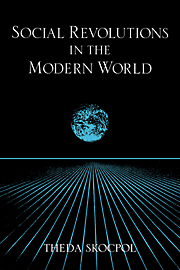Book contents
- Frontmatter
- Contents
- Acknowledgments
- INTRODUCTION
- I DOING MACROSCOPIC SOCIAL SCIENCE
- II MAKING SENSE OF THE GREAT REVOLUTIONS
- III A DIALOGUE ABOUT CULTURE AND IDEOLOGY IN REVOLUTIONS
- 7 Ideologies and social revolutions: Reflections on the French case
- 8 Cultural idioms and political ideologies in the revolutionary reconstruction of state power: A rejoinder to Sewell
- IV FROM CLASSICAL TO CONTEMPORARY SOCIAL REVOLUTIONS
- CONCLUSION
- Index
8 - Cultural idioms and political ideologies in the revolutionary reconstruction of state power: A rejoinder to Sewell
Published online by Cambridge University Press: 05 June 2012
- Frontmatter
- Contents
- Acknowledgments
- INTRODUCTION
- I DOING MACROSCOPIC SOCIAL SCIENCE
- II MAKING SENSE OF THE GREAT REVOLUTIONS
- III A DIALOGUE ABOUT CULTURE AND IDEOLOGY IN REVOLUTIONS
- 7 Ideologies and social revolutions: Reflections on the French case
- 8 Cultural idioms and political ideologies in the revolutionary reconstruction of state power: A rejoinder to Sewell
- IV FROM CLASSICAL TO CONTEMPORARY SOCIAL REVOLUTIONS
- CONCLUSION
- Index
Summary
It is a rare pleasure in intellectual life to have one's work confronted in a simultaneously appreciative and challenging fashion. I am indebted to William Sewell for offering an analytically sophisticated and historically grounded critique of the way States and Social Revolutions addresses the problem of ideology. He rightly points out that I treated the issues too cursorily and relied upon a notion of ideologies as deliberate blueprints for change that leaves untouched many of the ways in which ideas may affect the course of revolutions. Sewell offers instead “a much more robust conception of ideology … that treats ideology as anonymous, collective, and constitutive of social order.” According to Sewell, this way of understanding ideology is consonant with the overall structural analysis of States and Social Revolutions, and it can guide us toward wise questions and answers about the role of ideological transformations in the French Revolution and beyond.
If States and Social Revolutions “provoked” Sewell to write the preceding article, his able discussion has in turn encouraged me to think through more carefully how the analysis of ideologies should – and should not – be incorporated into future historical and comparative work on revolutions. Perhaps surprisingly, given my reputation for “structural determinism.” I shall suggest that we need a less “anonymous” approach than Sewell advocates. I certainly agree with Sewell that culture is “transpersonal,” but I want to register profound reservations about the use of anthropological conceptions of cultural systems in analyzing the contributions made by cultural idioms and ideological activities to revolutionary transformations.
- Type
- Chapter
- Information
- Social Revolutions in the Modern World , pp. 199 - 210Publisher: Cambridge University PressPrint publication year: 1994
- 6
- Cited by



